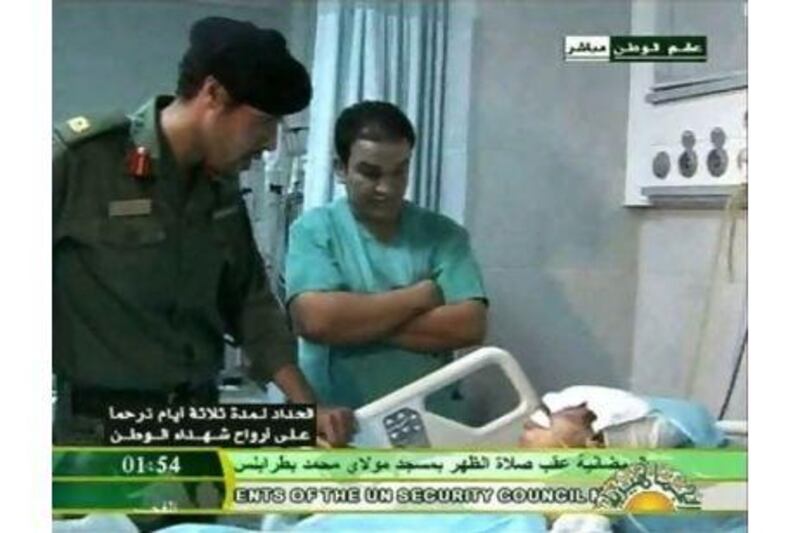BENGHAZI // Images claimed to be of Col Muammar Qaddafi's youngest son were broadcast on Libyan state television yesterday.
The footage appears to undercut rebel claims of his death at a time when the opposition is showing signs of disarray.
Khamis Qaddafi commands one of the best equipped and trained units in the Libyan military.
The images show a man said to be Khamis visiting victims of a Nato airstrike at a Tripoli hospital.
If genuine, the footage is the first time he has been seen in public since reports of his death last week.
The images come as the rebel leadership, known as the National Transition Council (NTC), grapples with fallout from the killing of its top military chief, Abdel-Fattah Younis, possibly by other rebels.
The rebels said on Friday that the younger Qaddafi was killed in a Nato air strike on Zlitan - a report Tripoli dismissed as a bid to deflect attention from Younis's killing.
Younis's body was found dumped outside Benghazi two weeks ago along with the bodies of two colonels, his top aides. They had been shot and their bodies burned.
Tensions over Younis's death spurred the leaders to sack their Cabinet late on Monday. On Tuesday they ordered the movement's armed factions to integrate in hopes of imposing some order.
"One good thing that could come of Younis's assassination is that the rebels will try to get the groups together and develop a coherent military force," said Libya expert Ronald Bruce St John.
"Then they will have a better chance to overthrow Qaddafi."
The US welcomed the reorganisation. The State Department said it was a sign that the national council, which the US and others recognise as Libya's legitimate government, is using Younis's slaying as an opportunity for "reflection" and "renewal" by firing its executive committee.
The Libyan revolt began in February, with the rebels wresting control of much of the eastern half of the country and pockets in the west.
Six months on, the conflict has settled into a stalemate.
The rebels have failed to budge the front lines in the east since April and have made only minor gains from the pockets they control in the western Nafusa mountains and city of Misurata. Qaddafi continues to control the rest of the west, despite continued Nato air strikes.
Younis was killed in June, shaking the opposition's leadership and their Western allies. The death also rattled the public in rebel-held areas, who have grown frustrated by a lack of progress. Wary of its slipping support, the NTC moved this week to restore public confidence and reassert its authority over the armed forces.
Both tactics aim to diffuse tensions over the Younis killing. If they succeed, it may mean a quicker advance to toppling Qaddafi.
On the military front, on Tuesday national council chief Mustafa Abdel-Jalil ordered all fighters to be incorporated into the national liberation army individually, not as a unit. Numerous groups of armed volunteers operate in eastern Libya.
Some battalions have gathered under an umbrella group called the Revolutionary Brigades, recognised by the national council alongside the National Army, which is made up of volunteers and ex-military personnel.
Among the Revolutionary Brigades is the Islamist group Obaida bin Jarrah, which has been blamed for Younis's death.
It was not clear if the numerous armed factions will heed the call to join the regular rebel army.
On the political front, the council on Monday dismissed the movement's executive committee, essentially a government Cabinet, after an investigation indicated that "administrative mistakes" led to Younis's killing.
Both moves reflect how deeply the rebel camp was shaken by the assassination of Younis, who served as Qaddafi's interior minister until he defected in the spring.
His move raised hopes among rebels and western allies that the uprising could succeed in unseating Qaddafi. But some rebels remained deeply suspicious that he retained loyalties to Qaddafi.
The council ordered Younis's arrest after a letter surfaced linking him to Qaddafi, according to an officer with the rebels' internal security forces - the official security force of the national council.
He suggested the killing had not been authorised by the council and was an act of vengeance by rebels.
The officer, who did not wish to be named, said Younis was brought back to the Benghazi area and held at a military compound when he was summoned to the defence ministry for questioning.
When leaving, two men from the security team escorting the detainees shot Younis, said the officer. He said the men were members of the February 17 Martyrs Brigade and shouted that Younis was a traitor.
"People want to know why he was arrested, why was the warrant signed. Someone has to be held responsible," said Faraj Najem, a London-based Libyan analyst.





